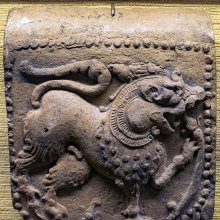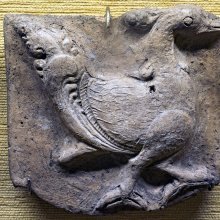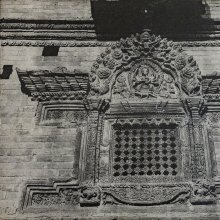Mritika, Mṛtikā: 2 definitions
Introduction:
Mritika means something in Hinduism, Sanskrit. If you want to know the exact meaning, history, etymology or English translation of this term then check out the descriptions on this page. Add your comment or reference to a book if you want to contribute to this summary article.
The Sanskrit term Mṛtikā can be transliterated into English as Mrtika or Mritika, using the IAST transliteration scheme (?).
Images (photo gallery)
In Hinduism
Purana and Itihasa (epic history)
Source: archive.org: Shiva Purana - English TranslationMṛtikā (मृतिका) refers to “clay”, according to the Śivapurāṇa 6.20. Accordingly as Subrahmaṇya said to Vāmadeva:—“[...] O sage Vāmadeva I shall now explain the rules of hair-cutting and ablution. These if performed immediately are conducive to great purity of the ascetic. O sage, after the consecration as a disciple he shall observe the other rites and get ready for the tonsorial ceremony. [...] He shall take clay (mṛtikā) from the root of Bilva, Aśvattha or Tulasi. He shall plunge into water twelve times and come to the bank. He shall place the clay on a pure spot of ground and divide it into three parts. Each part shall be divided into three. It shall be sprinkled with water with the astra-mantra”.

The Purana (पुराण, purāṇas) refers to Sanskrit literature preserving ancient India’s vast cultural history, including historical legends, religious ceremonies, various arts and sciences. The eighteen mahapuranas total over 400,000 shlokas (metrical couplets) and date to at least several centuries BCE.
Languages of India and abroad
Sanskrit dictionary
Source: DDSA: The Molesworth Marathi and English Dictionary (Sanskrit)Mṛtikā (मृतिका) is the Sanskrit form of the Marathi mātī, which means (1) “earth”; (2): Used freely to express utter destruction, utter worthlessness, insignificancy; (3) A term for the body (esp. as dead.)
Sanskrit, also spelled संस्कृतम् (saṃskṛtam), is an ancient language of India commonly seen as the grandmother of the Indo-European language family (even English!). Closely allied with Prakrit and Pali, Sanskrit is more exhaustive in both grammar and terms and has the most extensive collection of literature in the world, greatly surpassing its sister-languages Greek and Latin.
See also (Relevant definitions)
Relevant text
Search found 1 books and stories containing Mritika, Mṛtikā, Mrtika; (plurals include: Mritikas, Mṛtikās, Mrtikas). You can also click to the full overview containing English textual excerpts. Below are direct links for the most relevant articles:
Atharvaveda and Charaka Samhita (by Laxmi Maji)
4b. Leprosy (Kuṣṭha) in the Caraka-saṃhitā < [Chapter 5 - Diseases and Remedies in Atharvaveda and Caraka-Saṃhitā]



